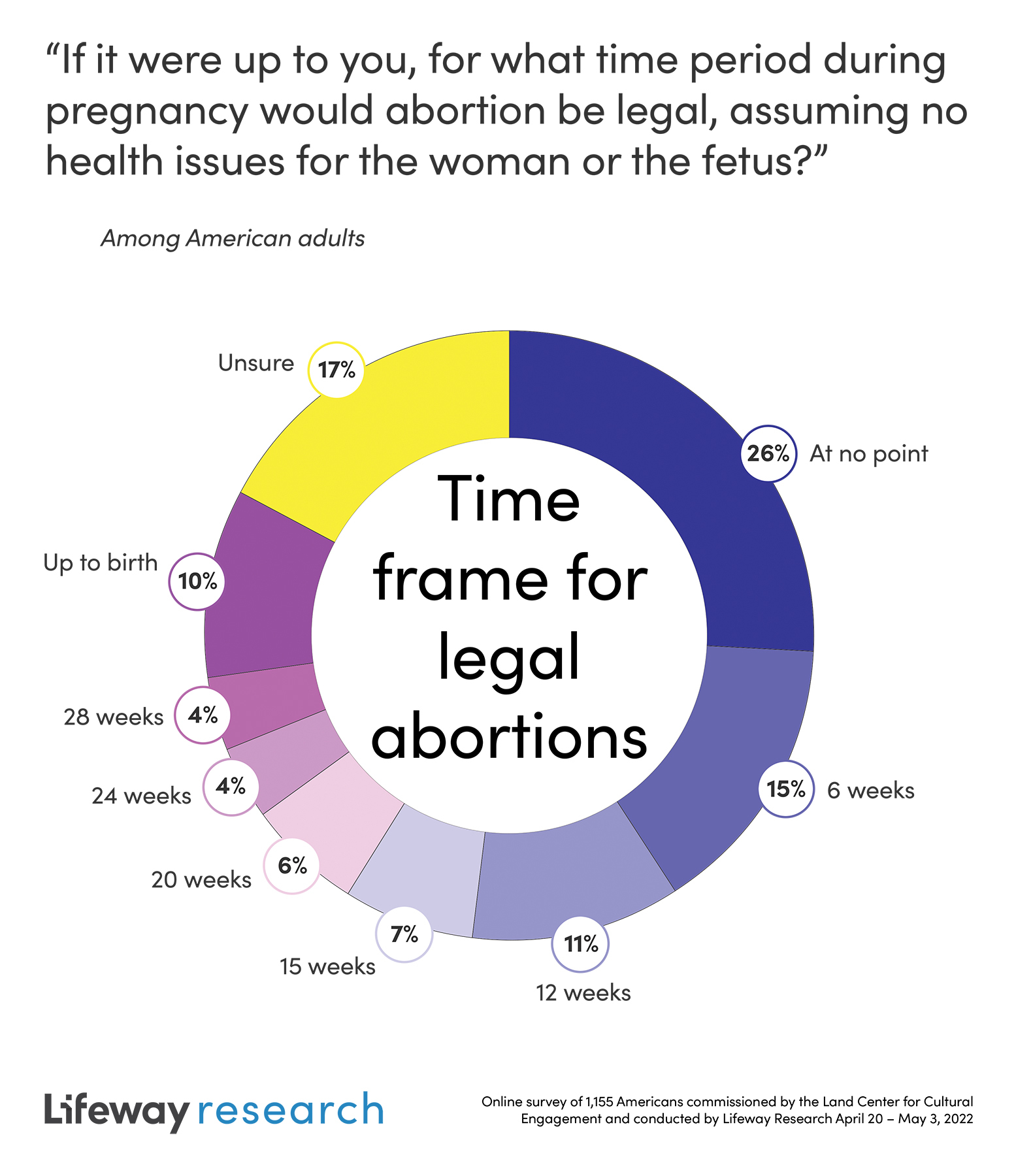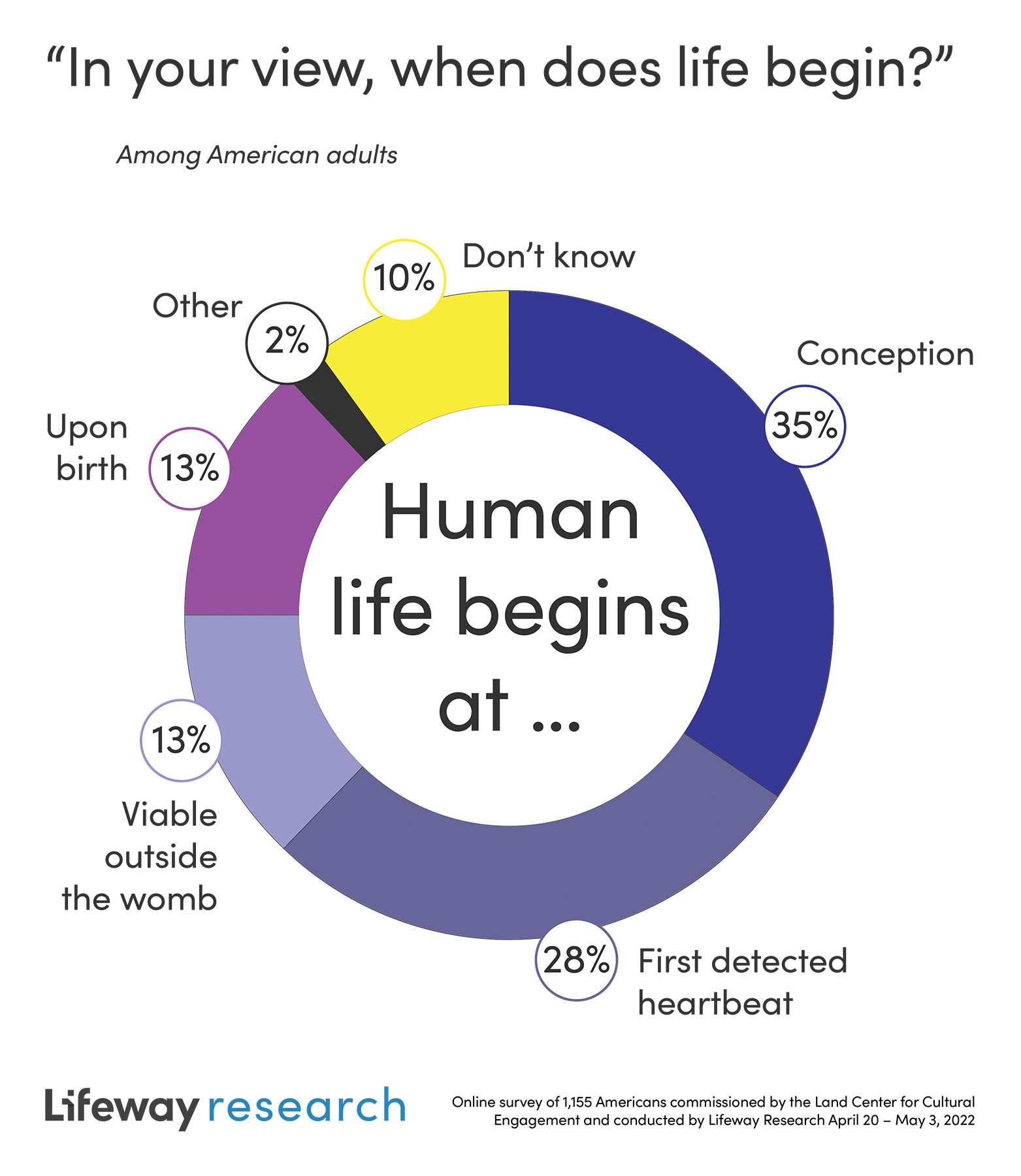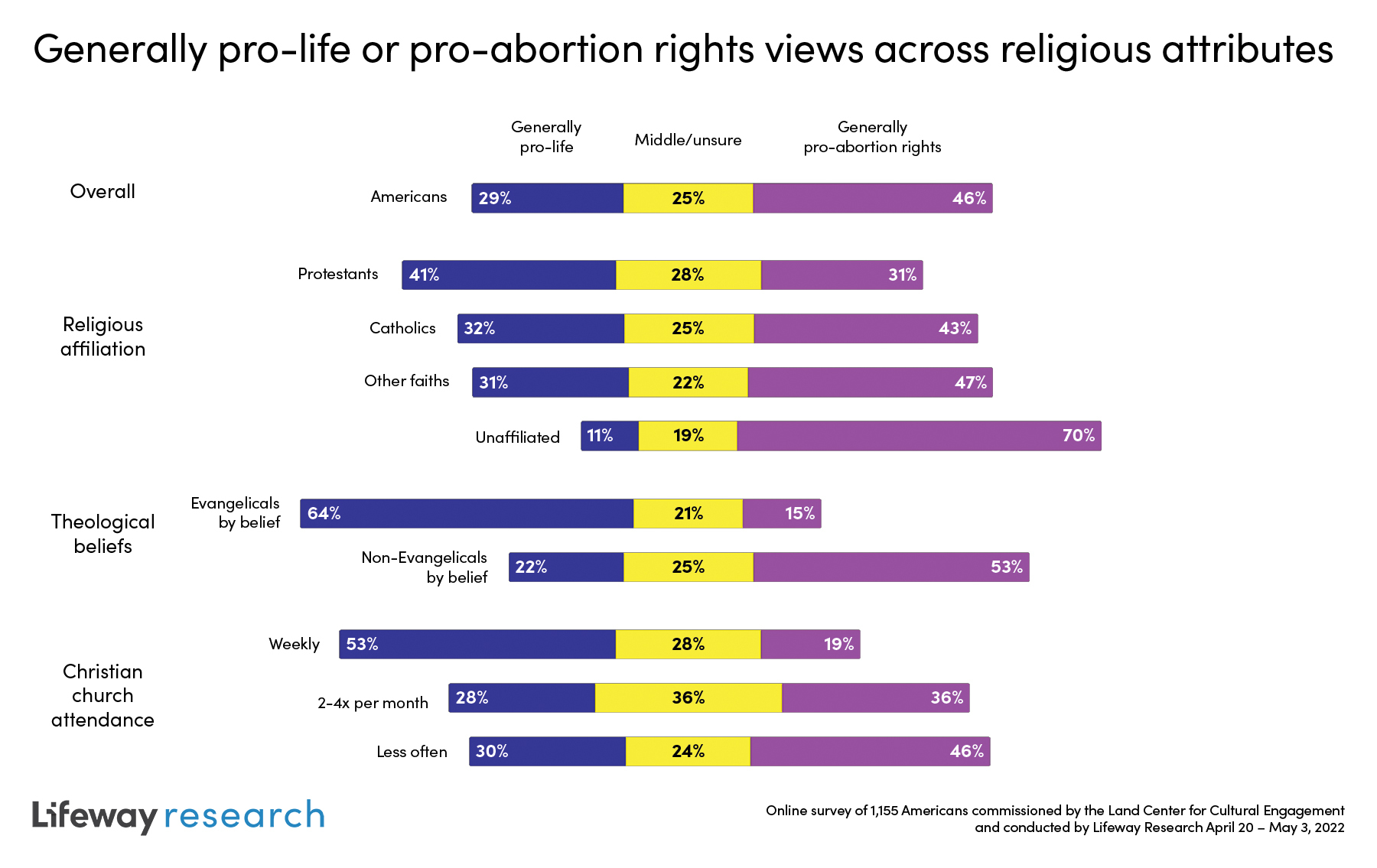On May 31st, 2022, the Land Center for Cultural Engagement and Lifeway Christian Research released a survey of Americans, measuring their beliefs about abortion. In the wake of a pending Supreme Court decision on Dobbs v. Jackson Women’s Health Organization, it is important to study public sentiment in this way.
This research, which surveyed 1,155 Americans, was in the field just before the leak of the draft Alito opinion which not only upholds the Mississippi abortion law at the heart of Dobbs, but also strikes down the precedent set in Roe v. Wade. The wide-ranging findings are compelling.
Here are five key findings I observed:
- A majority of Americans favor significant restrictions on abortion.
Only 26% of Americans favor a total ban on abortion, but 41% favor restrictions after the 6th week of pregnancy, and 52% favor restrictions after the 12th week. 59% of Americans favor a ban on abortions after 15 weeks and 65% favor a ban after 20 weeks. Those of us who believe in the sanctity of human life at conception, of course, are working for a day when human life is protected at all stages, but it is heartening to see the majority of Americans favor preserving life at earlier and earlier stages. This is a reminder that recently proposed, but defeated, legislation in the Senate (Women’s Health Protection Act) that would wipe out all existing abortion laws and allow abortion up until the moment of birth is out of step with a significant number of Americans. Only 10% of Americans support abortion up until the moment of birth, and 69% of Americans say that reducing abortions is important.

- A majority of Americans see life in the womb.
Few surveys on abortion ask the question we asked: “When does life begin?” The answers are interesting. 35% of Americans believe life begins at conception. Another 28% believe life begins at the detection of the first heartbeat. This reflects the growing awareness, perhaps due to technology, other scientific breakthroughs, and pro-life advocacy, that there is life in the womb. Putting these two numbers together reveals that a full 66% of Americans understand the unborn baby to be a distinct human person. Pro-life advocates have much more work to do, but we can be grateful that fewer and fewer Americans see a fetus as less than human.

- A majority of Americans oppose elective abortion based on economic hardship or ender preference.
The majority of Americans (78%) feel abortion should be legal if the mother’s life is in danger, in cases of rape (73%) and incest (72%), or if the child wouldn’t survive (64%) or has severe disabilities (58%), but only 37% of Americans support abortion if the mother simply doesn’t want the child, can’t give the child a good life (38%), is suffering financial hardship (37%) or wants a child of a different gender (15%).
This data shows that Americans only favor abortions in the most difficult situations, not as a medical procedure based on convenience of economic considerations, contrary to much of the narrative from pro-abortion rights advocates.
- Americans are thinking about a post-Roe future.
Though the survey found that most Americans (52%) don’t favor the overturning of Roe v. Wade, the decision that prevented states from passing abortion restrictions, they are clearly thinking about a post-Roe future. When asked what states should do if Roe is overturned, 36% say that they want states to restrict abortion further than it is currently, while 36% want their states to keep the status quo and only 28% hope for increased abortion access. This is significant in that while a majority favor Roe, only a slim majority want what many pro-abortion proposals have called for. This means that the failed Women’s Health Protection Act in the Senate bill and legislation in places like New York and California are out of step with the American people.
It’s also interesting where Americans rank abortion as a major concern in this election year. Only 38% of Americans consider this an issue of personal importance, outranked significantly by issues such as inflation (62%). 53% of Americans said a candidate’s views on abortion would significantly affect their vote. This was true for 63% of pro-life people surveyed, 57% of pro-abortion rights people surveyed, but only 31% of those in the middle or unsure of their position.
If Roe were overturned, however, Americans favor both government and religious involvement to help women in crisis. 74% of Americans agree that the church has a role in increasing support and options for women who have unwanted pregnancies. 81% of Americans, including 62% of pro-life people, also believe state governments have a responsibility to increase support and options for women who have unwanted pregnancies. Clearly, the reality of the end of Roe will shift the conversation to ways both government and the church meet the needs of families in crisis.
- Pro-life views begin in church
Lifeway’s research model defines evangelical much more narrowly, based on a set of beliefs, than other surveys. So it’s no surprised that evangelicals are the cohort who is the most pro-life. 66% of evangelicals believe life begins at conception, and 23% believe life begins with the first heartbeat. Those with evangelical beliefs are substantially more pro-life (64%) than those without them (22%). What’s more, those who attend worship weekly are more likely than others to be pro-life (53%) and say that life begins at conception (56%). Only 30% of regular churchgoers support Roe v. Wade (30%).

It is clear that holding distinctly evangelical beliefs and attending church regularly is formative in shaping a pro-life conscience. This should give hope to faithful pastors everywhere that preaching God’s Word has an important effect on the community and the country.
These are just some of the many important data points in our Land Center/Lifeway survey of Americans on abortion. While most of our fellow citizens favor restrictions on abortion, there is also much work to do to create a culture of life in America.

